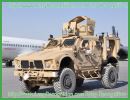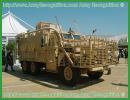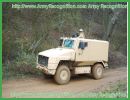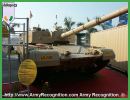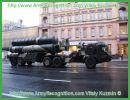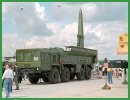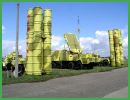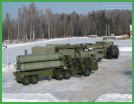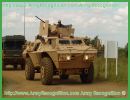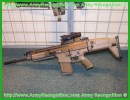| |
| |
Iran
 Back
Menu
Back
Menu
Iran to Unveil
New Generation of Zolfaqar main battle Tanks.
"Army's
Ground Force has carried out ample research and studies
for upgrading the technology and applications of Zolfaqar
tanks, and the updated version of the tank will be unveiled
in the (Iranian) month of Khordad (May 22-June 21),"
Commander of the Iranian Army Ground Force Brigadier
General Ahmad Reza Pourdastan said in an exclusive interview
with FNA today. "Fire navigation system of the
new Zolfaqar tank has been updated and Laser systems
have been mounted onto the tank," Pourdastan said,
adding, "These upgrades have remarkably increased
the tank's operational capabilities." Zolfaqar
is a second generation of Iran's main battle tank (MBT).
The test prototypes of the tank were evaluated in 1993.
Six semi-industrial prototypes of the tank were produced
and tested in 1997. The tank has a distinctive box-shaped,
steel-welded turret of local design. Zolfaqar combat
weight is reported to be 36 tons and has a 780 hp diesel
engine; the tank has a 21.7 hp per ton ratio.
27 May 2010 |
|
|
|
| |
Russia
 Back
Menu
Back
Menu
Russia to
test new model of Kalashnikov assault rifle in 2011.
State
tests of the new model of Kalashnikov automatic rifles
will be held in Russia next year, Izhmash Director General
Vladimir Grodetsky said on Tuesday. The new model of
the legendary assault rifle, the AK-200, is based on
the AK-74M and differs in weight (3.8 kilograms/8.4
lbs vs. 3.3 kilograms/7.3 lbs) and the magazine capacity
(30, 50, 60 rounds vs. 30). The AK-74, a developed version
of the Kalashnikov rifle's first model, the AK-47, was
introduced in 1974 and used by the Soviet forces during
the Afghanistan conflict. The AK-47 was originally created
by Mikhail Kalashnikov, who as a WWII soldier was inspired
to design the weapon after being wounded in 1941. While
his first attempts were unsuccessful, he was given a
position in weapons development, and by 1947 he had
perfected his masterpiece. Since then, the AK-47 has
become the most widespread and famous assault rifle.
Used by some 50 armies around the world, as well as
countless urban guerrilla movements, it is also featured
on the flag of Mozambique.
27 May 2010 |
|
|
|
| |
Australia
 Back
Menu
Back
Menu
Ocelot down-selected
for Australian Land 121 Phase 4 project
Force
Protection Europe's Ocelot light protected light protected
patrol vehicle has been down-selected by the Australian
Government to compete in the Land 121 Phase 4 Project
for the Protected Mobility Vehicle - Light (PMV-L) prototype.
27 May 2010 |
|
|
|
| |
United
States (Navistar)  Back
Menu
Back
Menu
Navistar
Defense Receives $61 Million to Support Allied MRAP Needs Vehicles to
Operate in Afghanistan.
Navistar
Defense, LLC today completed two Foreign Military Sales
worth a total of $61 million for 80 enhanced International
MaxxPro Dash Mine Resistant Ambush Protected (MRAP)
vehicles with DXM™ independent suspension. The
awards from the U.S. Marine Corps Systems Command include
parts and service support. Vehicles will support coalition
forces. The enhanced MaxxPro Dash with DXM suspension
offers vehicle operators a turning radius of 54 inches,
approximately 14.5 inches of wheel travel as well as
a number of enhanced capabilities. Upgrades have been
made to the windows and doors, which continue to utilize
an air-hydraulic system to ensure doors function in
the most extreme situations. The company is currently
delivering new Dash units with DXM suspension to U.S.
Forces and will begin deliveries to several allies at
the end of June. Navistar is the leading provider of
Category I MRAPs with 7,589 MaxxPro units on contract.
27 May 2010 |
|
|
|
| |
United
States  Back
Menu
Back
Menu
US Army Ground
Combat Vehicle Programme, three competitors.
Almost
three months after the US Army released a request for
proposal (RFP) for the technology development phase
of the Infantry Fighting Vehicle (IFV), developed within
the Ground Combat Vehicle (GCV) programme, three competing
teams, uniting key defence industry players of the US
and Europe, step up to the plate. The three competitors
include the BAE Systems/Northrop Grumman team, the General
Dynamics team, joined by Lockheed Martin, Raytheon and
MTU Detroit Diesel, as well as the SAIC-led team which
includes Boeing and the two German companies Krauss-Maffei
Wegmann (KMW) and Rheinmetall Defence.
26 May 2010 |
|
|
|
| |
Finland
 Back
Menu
Back
Menu
Finnish Defence
Forces has received 60 new SISU 8x8 Military Trucks.
Finnish
military vehicle supplier, Sisu Defence Oy, has handed
over 60 High Mobility SISU 8x8 Military Trucks to Finnish
Army. The delivery was received by the Minister of Defence,
Jyri Hakamies, at Sisu factory in Raasepori, Finland,
on 24.5.2010. Delivered trucks are equipped with effective
mine protection and feature a cabin of armour steel.
Additionally, part of these trucks are allocated to
be used in international crises management operations.
The latter are equipped also with ballistic protection
matching with the requirements of the intended use.
Sisu 8x8 Military Trucks feature a modular protection
system. Thereby, the ballistic and NBC protection of
the vehicles can easily be assembled on or dismounted,
quickly even in field. The delivery includes also a
training, servicing and spare parts program. The value
of the delivery altogether is approximately EUR 26 Million,
excl. VAT.
26 May 2010 |
|
|
|
| |
Poland
 Back
Menu
Back
Menu
First US
Patriot Battery missile Arrives in Poland.
In the midst of an increasingly improving political
environment between the US and Russia comes a signal
from the Polish-Russian border that may hamper the basis
for dialogue between the two former antagonists. On
Monday, the US Embassy in Warsaw confirmed that the
first US surface-to-air Patriot missile battery arrived
at a Polish military base in the town of Morag, some
57 kilometres south of the Russian exclave of Kaliningrad
Oblast on the Baltic shore. The first of these air and
missile defence systems will initially be operated by
some 100 to 150 US soldiers deployed to Morag. According
to the Embassy, this is the first such deployment on
Polish soil.
25 May 2010 |
|
|
|
| |
India
 Back
Menu
Back
Menu
The Indian
Army is planning to import a short-range surface-to-air-missile.
The
Indian Army is planning to import a short-range surface-to-air-missile
(SAM) system to replace its obsolete Soviet-vintage
OSA-AK (SA-8 'Gecko') and Kub (SA-6 'Gainful') units
to counter threats to cities and important installations
from enemy aircraft and missiles. In an international
request for information (RfI) dispatched on 29 April,
the army announced its requirement for a short-range
SAM system with active and passive guidance and a 20
km strike range capability to hit multiple and hovering
targets simultaneously moving at speeds between zero
to 500 m per second.
24 May 2010 |
|
|
|
| |
United
Kingdom  Back
Menu
Back
Menu
New combat
uniforms camouflage for British troops in Afghanistan.
British
military personnel in Afghanistan have started wearing
uniforms bearing the first new camouflage design in
over 40 years. The
new Multi-Terrain Pattern (MTP) camouflage was unveiled
in December last year and began to be worn by soldiers
in Afghanistan in April 2010. It will be issued to all
military personnel by 2012. The camouflage is intended
to help British troops blend into Afghanistan's varied
terrain. It was trialled in laboratory tests and field
evaluations to assess overall performance, with pilot
trials held before the final testing. This included
aerial and scientific photography to provide the right
colours and brightness for the new camouflage pattern.
Colours were fed into a computer and computer modelling
was used to represent the Green Zone, deserts and mixed
environments in Afghanistan. A number of camouflage
samples were then generated based on the colours found
in Afghanistan and via the computer modelling trials.
The new MTP camouflage will work across different terrains
in Helmand province, such as compounds, grassland, crops
and woodland - all the areas our troops encounter on
patrol. Members of the Royal Dragoon Guards are among
the first to be issued with the new pattern.
21 May 2010 |
|
|
|
| |
United
States  Back
Menu
Back
Menu
Oshkosh corporation
awarded more than $234.8 million in delivery orders for M-ATV protection
kits.
Oshkosh
Corporation (NYSE: OSK), a leading manufacturer of specialty
vehicles and vehicle bodies, announced today that its
Defense division has received four delivery orders valued
at more than $234.8 million from the TACOM Life Cycle
Management Command (LCMC) to supply more than 4,300
MRAP All-Terrain Vehicle (M-ATV) protection kits. Oshkosh
will deliver more than 3,800 rocket-propelled grenade
(RPG) protection kits, as well as more than 500 explosively
formed penetrator (EFP) add-on armor kits and in-field
service and parts. Work under the orders is expected
to be completed in April 2011.
21 May 2010 |
|
|
|
| |
United
Kingdom  Back
Menu
Back
Menu
British Government
has requested a possible sale of 102 Mastiff/MRAP Cougar II 6x6 vehicles.
The
Defense Security Cooperation Agency notified Congress
May 19 of a possible Foreign Military Sale to the United
Kingdom of 102 Mastiff/MRAP Cougar Category II 6X6 modified
vehicles and associated equipment, parts, and logistical
support for an estimated cost of $122 million. The Government
of the United Kingdom has requested a possible sale
of 102 Mastiff/MRAP Cougar Category II 6X6 modified
vehicles, tools and test equipment, maintenance support,
contractor technical and logistics personnel services,
support equipment, spare and repair parts, and other
related elements of logistics support. The estimated
cost is $122 million.
20 May 2010 |
|
|
|
| |
United
Kingdom  Back
Menu
Back
Menu
U.K. Invites
Force Protection, Supacat To Tender for Patrol Vehicle Buy.
A
competition to replace the British Army's Snatch Land
Rover armored vehicle has approached the end game after
the issue of an invitation to tender to the two companies
vying to secure the deal. Force Protection Europe with
the Ocelot is head-to-head with the rival SPV400 vehicle
offered by Supacat to supply an initial batch of 200
light protected patrol vehicles for troops operating
in Afghanistan. The winning vehicle, being supplied
as an urgent operational requirement, will offer troops
better protection and greater mobility than the much-maligned
Snatch machine. The invitations issued by the Ministry
of Defence are scheduled to be returned in June, with
a decision on a winning contractor expected in early
autumn.
20 May 2010 |
|
|
|
| |
India
 Back
Menu
Back
Menu
Indian Army
To Buy Second Batch of Arjun Tanks.
The
Indian Army has ordered and placed fresh orders for
purchase of additional 124 homemade Arjun tanks following
March comparative trials with the Russian-built T-90
tank. The Defence Research and Development Organisation,
which produced the tank, has been urging the Army, which
ordered an initial 124 tanks, to order a second batch
to make the assembly line economical.
19 May 2010 |
|
|
|
| |
Belarus
 Back
Menu
Back
Menu
Russian air
defense missiles systems S-400 and Iskander will equip the Belarus army.
The
common space of defense thus requires that the two armies
are equipped with the same equipment, Minsk will be
able to receive Russian missile system S-400 and Iskander,
announced Wednesday 19 May 2010 to the Press Agency
RIA Novosti, Sergueï Gouroulev, president of the
Committee military-industrial of Belarus. “Here
no voluntarism on behalf of the Defence Minister. We
are a union, a common space of defense, a plain regional
anti-missile defense system. For that the equipment
of the armed forces must be in conformity with a precise
project: the law of programming soldier 2006-2015, the
annual invitation to tender of the military ordering
of State”, it indicated. Russian and Belarus soldiers
had evoked on several occasions that Minsk was to receive
ground-to-air missiles S-400 and Iskander missiles systems,
but according to Sergueï Gouroulev the project
of construction of the Belarus Armed forces do not stipulate
obligatorily the equipment in this precise type of missiles
and systems. “It is written there: “to have
systems of type Iskander and ground-to-air missiles
S-400”, explained the interlocutor of the agency.
19 May 2010 |
|
|
|
| |
United
Kingdom (Supacat)  Back
Menu
Back
Menu
Further Blast
Testing is conducted on the Supacat SPV400
The
Supacat SPV400, the all-British, all-new contender from
Supacat to meet the UK Ministry of Defence's Light Protected
Patrol Vehicle (LPPV) requirement was, this week, subjected
to a second round of blast tests as part of the vehicle's
development programme. A number of blast tests were
conducted to correlate development work and prove the
upgrades and improvements incorporated into the SPV400
design since the first round of testing in December
2009. The results were very positive and consistent
with expectations. Whilst for security and competitive
reasons the detail cannot be released, the size of the
blasts were "very significant" and underwrote
Supacat's philosophy of future proofing the SPV400 design
by aiming for protection levels above those within the
LPPV requirement. Further refinement will now take place
prior to another round of testing next month.
17 May 2010 |
|
|
|
| |
India
 Back
Menu
Back
Menu
Indian army
tests successfully medium range ballistic missile Agni-2.
The
Indian Army carried out Monday morning May 17th, 2010,
a shooting test of Agni-II medium range ballistic missile,
announced Monday the press agency Trust of India. The
missile, length 21 meters and weighing 17 tons were
firing since the polygon from the island of Wheeler
(bay of Bengal). According to the agency, the firing
was successful. The Agni-2 missile is able to carry
a load of a ton to the distance of two thousand kilometres.
Its range can be increased by the reduction of the weight
of its warhead. The two preceding firing tests of Agni-2,
carried out in April 1999 and in November 2009, had
shown a failure.
17 May 2010 |
|
|
|
| |
Russia
 Back
Menu
Back
Menu
Russia, India
plan to hold peacekeeping drills in fall.
Up
to 150 Russian troops will take part in joint peacekeeping
exercises with India scheduled for autumn this year,
the Russian Defense Ministry said on Monday 17 May 2010.
A group of Russian officers has already arrived in India
to attend the first planning stage of the INDRA 2010
exercise. "During the planning stage, the sides
will work out a detailed plan of the exercises, reconnoiter
the area where the drills will take place and discuss
logistics issues," the ministry said in a statement.
Russia is planning to send a motorized infantry company
to join the Indian troops in the drills. The Russian
and Indian military have conducted joint INDRA exercises
since 2003, including biannual peacekeeping drills.
Russia's military cooperation with India goes back nearly
half a century, and the Asian country accounts for about
40% of Russian arms exports.
17 May 2010 |
|
|
|
| |
Russia
 Back
Menu
Back
Menu
Russia creates
weapons able to avoid a space attack.
Russia
creates weapons able to avoid a space attack, declared
this Saturday 15 May 2010 Edouard Sigalov, commander
of a Russian anti-aircraft system brigade equipped with
ground-to-air missiles S-300 PM and S-400. “We
are developing new weapons able to destroy targets in
space”, indicated colonel Sigalov before adding
that the Russian army should soon “protect the
sky from Moscow against the space attacks”. The
5th brigade of Russian anti-aircraft and space defence
is deployed in the area of Moscow. Strong of more than
4.500 men, the operational units of the brigade are
able to open fire in 10 minutes and to destroy all the
flying targets in their sector. The systems S-400 “Triumph”
(code NATO: SA-21 Growler) make it possible to organize
a spread out defence of the sites against a massive
air attack. The speed of the missiles reaches 4.800
m/sec and their range operating is of 400 km at an altitude
of 30 km. Moreover, the range minimum is of 2.000 m
at an altitude of 100 m. They can be put in position
of combat in the time of 5-10 minutes.
15 May 2010 |
|
|
|
| |
United
Kingdom (BAE Systems)  Back
Menu
Back
Menu
BAE Systems
open office in Jordan
BAE
Systems is to open an office in the Hashemite Kingdom
of Jordan to support its ongoing business with the Jordanian
Armed Forces and collaborative activities with the King
Abdullah Design and Development Bureau (KADDB). The
office will complement the network of offices the company
operates across the region and will be used as the focal
point for business in Jordan and neighbouring countries.
The office is expected to be fully operational by the
end of the year and will be developed in line with legal
and regulatory requirements of the Kingdom and according
to developing business prospects. Jeff McCray, Regional
Vice President Africa and Near East, commented: "This
move underlines our commitment to the Hashemite Kingdom
of Jordan and developing business prospects in the region."
14 May 2010 |
|
 |
| BAE
Systems, the global defence, security and aerospace company |
|
|
| |
Israel
 Back
Menu
Back
Menu
The Magna
thermal camera system developed for border surveillance, recently came
into use in the Central Command.
The
Judea and Samaria Area Division of the Central Command
recently introduced the Magna to its services, a thermal
camera system that provides intelligence information
for soldiers serving in the operation room in the area.
The new system, which was developed by Magna Company
in the Rotem Industrial Park in Dimona, was received
this month by the Yehuda (Territorial) Brigade around
Hebron and is in the final stage of installation. In
the future, the Magna system integration process is
expected to expand to the entire Central Command, likewise
the camera is expected to be installed at additional
sites.
13 May 2010 |
|
|
|
| |
United
States (BAE Systems)  Back
Menu
Back
Menu
BAE Systems
Receives $5 Million U.S. Army Contract for Patriot Vehicles for Taiwan.
BAE
Systems today announced the award of a $5.5 million
contract from the U.S. Army Tank-Automotive and Armaments
Command (TACOM) to manufacture 24 Patriot support vehicles
for Taiwan. These vehicles will be configured on the
Long-Term Armor Solution (LTAS) equipped Family of Medium
Tactical Vehicles (FMTV). The LTAS system, specifically
designed for the FMTV by BAE Systems, is comprised of
the ready for armor cab, or A-Cab, and appliqué
armor, or B-kit. The A-Cab configuration allows crews
to operate the FMTV in on- and off-road, non-tactical
and low-threat tactical environments with minimal vehicle
weight. The crews can increase their protection during
periods of increased threat levels by installing the
B-kits. Under this contract BAE Systems will manufacture
eight Specially Modified Long Wheel Base Chassis, nine
cargo vehicles and seven tractors. The vehicles will
be produced in Sealy, Texas and delivered to the Army
by December 2010.
12 May 2010 |
|
|
|
| |
United
States (Textron)  Back
Menu
Back
Menu
Textron to
Deliver 423 Additional Armored Security Vehicles to US Army.
Textron
Marine & Land Systems, an operating unit of Textron
Systems, a Textron Inc. company, today announced the
signing of a new base contract award for the M1117 Armored
Security Vehicle (ASV) and M1200 Armored Knight with
the U.S. Army Tank-automotive and Armaments Command
(TACOM). The finalized contract includes an exercised
option for 423 vehicles (327 M1117s and 96 M1200s) with
provisions for future options of up to 272 more vehicles.
These quantities are in addition to a base order previously
awarded under a letter contract award of 191 M1117 ASVs
and 65 M1200 Armored Knight vehicles, field support
and special sustainment tools, as well as technical
and field services. Delivery of these latest orders
are expected to commence October 2010 and, should all
options of the contract be exercised, could continue
through the first quarter of 2012. The contract totals
approximately $461 million with an additional $239 million
in options remaining to be exercised. Textron Marine
& Land Systems has delivered a total of 2,600 ASVs
to the U.S. Army to-date.
12 May 2010 |
|
|
|
| |
United
States (Raytheon)  Back
Menu
Back
Menu
The Hy-DRA
Hybrid-Defense Reconnaissance Assault Vehicle launched at SOFEX Defense
Exhibition.
US
prime Raytheon is entering the automotive market with
an innovative new all-terrain vehicle (ATV) aimed at
the special forces market. Officially launched at the
Special Operations Forces Exhibition (SOFEX), held in
Amman, Jordan, from 10-13 May, the Hybrid-Defense Reconnaissance
Assault (Hy-DRA) vehicle is a small, stealthy all-terrain
platform employing hybrid electric drive (HED). With
one forward seat for the driver and two back seats facing
forwards, the Hy-DRA can carry three fully equipped
soldiers, act as a weapons platform or carry one soldier
and two litters to extract wounded personnel.
10 May 2010 |
|
|
|
| |
United
States  Back
Menu
Back
Menu
The futur
weapons for the US Army presented at the Aberdeen Test Center.
The
Army's Program Executive Office Soldier showcased some
of its products May 5 at the Aberdeen Test Center here.
Among those products were the XM153 Common Remotely
Operated Weapon Station, the M2 .50 Caliber Machine
Gun with M2E2 Quick Change Barrel Kit, the lighter weight
M240L Medium Range Machine Gun, and the XM25 Counter
Defilade Target Engagement System. Aboard
the XM25 is a laser rangefinder that can measure the
distance to the target and place an adjusted aim point
on a targeting screen. The system then allows Soldiers
to choose to over-shoot the measured distance so the
round will explode inside the building.
10 May 2010 |
|
|
|
| |
France
 Back
Menu
Back
Menu
First French
VBCI (Infantry Armoured Fighting Vehicle) on the way for Afghanistan
The
Belfort-based 35th Infantry Regiment, the first French
Army unit to convert to the new Véhicule de Combat
de l’Infanterie (VBCI, or infantry combat vehicle),
and which subsequently carried out the vehicle’s
operational evaluations, will deploying two platoons
to Afghanistan this summer. The ten VBCIs embarked on
May 10, at the Toulon naval base, on the MS Eider, a
commercial vessel chartered by the Ministry of Defense.
The ship is due to sail on May 12 and is due to arrive
in theater in the early summer. The two VBCI sections
will be integrated into the Joint Tactical Groups operated
by the 21st Marine Infantry Regiment (Fréjus)
and the 126th Infantry Regiment (Brive), and respectively
deployed in the Kapisa and Surobi regions of Afghanistan.
10 May 2010 |
|
|
|
| |
France
 Back
Menu
Back
Menu
French DGA
Orders 187 PVP Panhard Small Armoured Vehicles
On
7 May 2010 the French Armament Procurement Agency (Direction
generale de l`armement, DGA) ordered 187 small armoured
vehicles (petits vehicules proteges, PVP) from Panhard
General Defense. This order is for the last lot from
the contract for a total of 933 PVPs, signed on 7 September
2004. So far, 506 PVPs have been delivered to the French
Army. The deliveries are scheduled to be completed in
2011. The PVPs are manufactured at the two industrial
facilities at Marolles-en-Hurepoix (Essonne) and Saint-Germain-Laval
(Loire). The PVP programme comprises a total of approximately
one million work hours for Panhard and its sub-suppliers.
The initial delivery contract provided for the delivery
of 200 PVPs per year starting in late 2007 through 2012.
The acceleration of deliveries and orders, agreed within
the framework of the economical revitalisation plan,
has allowed increasing the production cycle to 300 PVP
per year in 2009 and 2010.
12 May 2010 |
|
|
|
| |
France
 Back
Menu
Back
Menu
First deliveries
of the counter-mining system vehicle SOUVIM 2 to the French armament
procurement agency.
Development
of SOUVIM 2, a mine path clearing system designed and
manufactured by MBDA since 2008, has just been completed.
Two units of this land vehicle set will be delivered
very shortly to the DGA, the French armament procurement
agency and will undergo final qualification testing
before delivery to the French Army. In line with the
DGA's aim, the French Army will be ready to deploy this
system on foreign theatres in 2010. SOUVIM 2 was designed
for use in mobility support missions, allowing quick
clearing of mined paths over long distances behind the
lines: over 100 km of track cleared daily, with extensive
counter-mining capabilities. The SOUVIM 2's performance
is currently unequalled.
07 May 2010 |
|
|
|
| |
Belgium
(FN Herstal)  Back
Menu
Back
Menu
Assault
rifle SCAR FN Herstal for the American Special forces
FN
Herstal, S.A. (FN) received notification from the USSOCOM
Program Executive Office—SOF Warrior (PEO—SW)
that the SCAR
Acquisition Decision Memorandum (ADM) was approved and
signed on April 14, 2010, moving this FN program into
the Milestone C phase. This decision authorizes the
production and deployment of the Special Operations
Forces (SOF) Combat Assault Rifle (SCAR) MK 16 and MK
17, as well as the Enhanced Grenade Launcher Module
(EGLM) MK 13.
06 May 2010 |
|
|
|
| |
Israel
 Back
Menu
Back
Menu
Elbit Systems
Awarded $50 Million UAS Contract by the Israeli Defense Ministry for
the delivery of UAS Hermes® 900 and Hermes® 450.
Elbit
Systems Ltd. (NASDAQ: ESLT and TASE:ESLT) announced
this 02 May 2010, that it was awarded an Unmanned Aircraft
System (UAS) contract from the Israeli Ministry of Defense,
valued at approximately $50 million. Under the contract,
Elbit Systems will supply the Israeli Defense Forces
(IDF) with its brand new Hermes® 900 unmanned systems
along with additional Hermes® 450 unmanned systems
to expand the IDF's current Hermes® 450 fleet. In
addition, the Company will supply the IDF with an enhancement
of its existing UAS intelligence capabilities. The contract
will be carried out over a three-year period.
02 May 2010 |
|
|
|
| |































